Akwa Ibom State
Akwa Ibom is a state in Nigeria. It is located in the coastal southern part of the country, lying between latitudes 4°32′N and 5°33′N, and longitudes 7°25′E and 8°25′E. The state is located in the South-South geopolitical zone, and is bordered on the east by Cross River State, on the west by Rivers State and Abia State, and on the south by the Atlantic Ocean and the southernmost tip of Cross River State.
Akwa Ibom State | |
|---|---|
 Flag 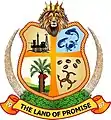 Seal | |
| Nickname(s): Land of Promise, Akwa Abasi Ibom state | |
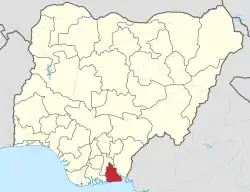 Location of Akwa Ibom in Nigeria | |
| Coordinates: 05°00′N 07°50′E | |
| Country | |
| Date created | 23 September 1987 |
| Capital | Uyo |
| Government | |
| • Governor (List) | Udom Gabriel Emmanuel (PDP) |
| • Deputy Governor | Moses Ekpo |
| • Speaker | Aniekan Bassey |
| • Senators | |
| Area | |
| • Total | 7,081 km2 (2,734 sq mi) |
| Area rank | 30 of 36 |
| Population (2016)[1] | |
| • Total | 5,450,758 |
| • Rank | 15 of 36 |
| • Density | 770/km2 (2,000/sq mi) |
| Demonym(s) | Akwa Ibomite |
| GDP (PPP) | |
| • Year | 2007 |
| • Total | $11.18 billion[2] |
| • Per capita | $2,779[2] |
| Time zone | UTC+01 (WAT) |
| Dialing Code | +234 |
| ISO 3166 code | NG-AK |
| HDI (2018) | 0.604[3] medium · 17th of 37 |
| Website | akwaibomstate |
Akwa Ibom is one of Nigeria's 36 states, with a population of over five million people in 2016. The state was created in 1987 by Ibrahim Babangida from the former Cross River State and is currently the highest oil- and gas-producing state in the country. The state's capital is Uyo, with over 500,000 inhabitants. Akwa Ibom has an airport and two major seaports on the Atlantic Ocean with a proposed construction of a seaport at Ibaka, Oron. The state also has a 30,000-seat sports complex. It is shaped like the Allianz arena stadium.[4] Akwa Ibom state is also home to the Ibom E-Library, an information centre.[5] In addition to English, the main spoken languages are Ibibio, Annang, Ekid, Oro and Obolo.[6]
History
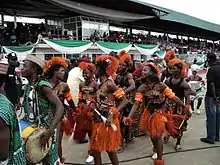
The region of the state was created out of Cross River State on September 23, 1987 by the then Military Administration of General Ibrahim Badamosi Babangida.[7] No central government existed among the people of what is now Akwa Ibom State prior to the British invasion in 1904. Instead, the Annang, Oron, Efik, Ibonos and Ibibio were all autonomous groups.
Although several Scottish missionaries arrived in Calabar in 1848, and Ibono in 1887, the British did not firmly establish control of the area until 1904. In that year, the Enyong Division was created encompassing the area of the current state of Akwa Ibom, with headquarters at Ikot Ekpene, an Annang city described by the noted Africanist Kaanan Nair, as the cultural and political capital of Annang[8] and Ibibio.[9]
The creation of Enyong Division for the first time allowed the numerous ethnic groups to come together. This further provided a venue for the creation of the Ibibio Welfare Union, later renamed Ibibio State Union. This social organization was first organized as a local development and improvement forum for educated persons and groups who were shut out from the colonial administration in 1929. Nonetheless, some historians have wrongly pointed to the union to buttress their argument about the homogeneity of groups in the area. The Obolo Union, comprising Ibono and Andoni stock, was another strong socioeconomic and cultural organization that thrived in the region. The Ibono people have fought wars to maintain their unique identity and territory in the region more than any other group.
When Akwa Ibom state was created in 1987, Uyo was chosen as the state capital to spread development to all regions of the state.
Governance
Politics in Akwa Ibom state are dominated by the three main ethnic groups: the Ibibio, Annang and Oron. Of these three, the Ibibio remain the majority and have held sway in the state since its creation. For the past eight years, the Annang people held sway, since the governor for those eight years was from Ikot Ekpene senatorial district.
Ministries, Departments and Agencies
Here are the list of ministries in Akwa Ibom[10]
- Akwa Ibom State Ministry of Justice
- Akwa Ibom State Ministry of Agriculture and Food Sufficiency
- Akwa Ibom State Ministry of Account and Finance
- Akwa Ibom State Ministry of Works
- Akwa Ibom State Ministry of Education
- Akwa Ibom State Ministry of Environment
- Akwa Ibom State Ministry of Transport & Petroleum Resources
- Akwa Ibom State Ministry of Local Government and Chieftaincy Affairs
- Akwa Ibom State Ministry of Lands, Town Planning & Survey
- Akwa Ibom State Ministry of Information & Strategy
- Akwa Ibom State Ministry of Health
- Akwa Ibom State Ministry of Science & Technology
- Akwa Ibom State Ministry of Women Development and Social Development
- Akwa Ibom State Ministry of Youth & Sports
- Akwa Ibom State Ministry of Administration & Supplies
- Akwa Ibom State Ministry of Economic Development Labour and Manpower Planning
- Akwa Ibom State Ministry of Investment, Commerce and Industries
- Akwa Ibom State Ministry of Culture and Tourism
- Akwa Ibom State Bureau of Political/Legislative Affairs and Water Resources
- Akwa Ibom State Bureau of Rural Development & Cooperatives
Local Government Areas
Akwa Ibom State consists of thirty-one (31) local government areas. They are:
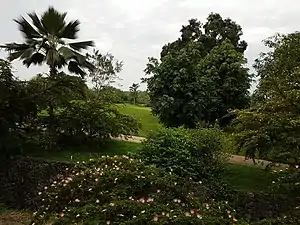
Demographics
Religion
The people in Akwa Ibom are predominantly Christian.
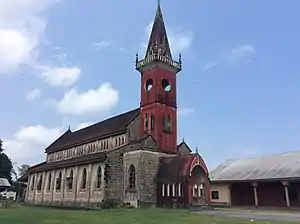
Languages
Like their Efik neighbors of Cross River State, people of Akwa Ibom speak various dialects of the Ibibio-Efik languages, which belong to the Benue–Congo language family, forming part of the Niger–Congo group of languages.
The following table lists languages of Akwa Ibom State and the local government areas in which they are spoken:[12]
| Language | LGA(s) spoken in |
|---|---|
| Anaang | Abak, Essien Udim, Ika, Ikot Ekpene, Oruk-Anam, Ukanafun |
| Obolo | Eastern Obolo |
| Ekid | Eket, Esit Eket |
| Etebi | Esit Eket |
| Ibibio | Etinan, Ibiono Ibom, Ikono, Ikot Abasi, Itu, Mkpat Enin, Nsit Atai, Nsit-Ubium, Onna, Uruan, Uyo |
| Ibuno | Ibeno |
| Ika Oku | Ika |
| Nkari | Ini |
| Itu Mbon Uso | Ini |
| Idere | Itu |
| Efik | Itu, Uruan |
| Ebughu | Mbo, Oron |
| Efai | Mbo |
| Enwan | Mbo |
| Oro | Mbo, Oron, Udung Uko, Urue-Offrong-Oruko |
| Iko | Eastern Obolo |
| Oro | Okobo |
| Ilue | Oron |
| Khana | Oruk-Anam |
Education
The Akwa Ibom State Ministry of Education is tasked with monitoring the education sector of the state. The current region of Akwa Ibom State in old Calabar Kingdom was the first to encounter Western education in Nigeria with the establishment of Hope Waddell Training Institute, at Calabar in 1895, and the Methodist Boys' High School, Oron in 1905 as well as other top schools such as the Holy Family College at Abak and Regina Coeli College in Essene.
Some educational institutes in the state are:
- University of Uyo, Uyo[13]
- Maritime Academy of Nigeria, Oron[14]
- Akwa Ibom State University (Oruk Anam LGA and Mkpat Enin LGA)[15]
- Obong University, Obong Ntak
- Akwa Ibom State Polytechnic Ikot Osurua[16]
- Uyo City Polytechnic Nduetong Oku
- Apex Polytechnic
- Heritage Polytechnic, Eket[17]
- School of Nursing; Uyo, Eket, Oron, Ikot Ekpene, Etinan
- Akwa Ibom State College of Education, Afaha Nsit
- School Of Basic Studies, Abak
- College of Arts & Sciences, Nnung Ukim
- Ritman University
- Sure Polytechnic, Ukanafun
- Trinity Polytechnic Uyo[18]
Notable people
- Obong Victor Attah, former governor of Akwa Ibom State
- Senator Godswill Akpabio, former governor of Akwa Ibom State, former Senate Minority Leader
- Effiong Dickson Bob
- Ini Edo, Nollywood Actress
- Obong Ufot Ekaette, secretary to the Government of the Federal Republic of Nigeria from 1999 to 2007 under President Olusegun Obasanjo
- Dominic Ekandem first cardinal in English-speaking West Africa. First Nigerian Cardinal to qualify as a candidate to the papacy.
- Senator (Engr.) Chris Ekpenyong Former deputy governor of Akwa Ibom State in the Victor Attah administration and current Nigerian Senator representing Akwa Ibom North-West Senatorial District in the 9th Assembly.
- Engr. Patrick Ekpotu, former Deputy Governor of Akwa Ibom State
- Udom Gabriel Emmanuel, Governor of Akwa Ibom State from May 2015 to date
- Senator Ita Enang, Senior Special Assistant (Niger-Delta) to President Muhammadu Buhari
- Vincent Enyeama, professional footballer (Goalie) and former Super Eagle captain
- Mark Essien, entrepreneur and founder of Hotels.ng
- Chief Donald Etiebet, former Minister of Petroleum
- Nse Ikpe-Etim, Nollywood actress
- Eve Esin, Nollywood actress
- Etim Inyang, former Inspector General of the Nigerian Police Force (I.G.P) 1985 to 1986
- Obong Akpan Isemin, elected governor of Akwa Ibom State in Nigeria from January 1992 to November 1993 during the Nigerian Third Republic
- Clement Isong, second governor of the Central Bank of Nigeria; first civilian governor of the former Cross River State
- Emem Isong, multi-award winning filmmaker and CEO of Royal Arts Academy
- Rt. Hon. Onofiok Luke, the 11th Speaker of the Akwa Ibom State House of Assembly and the Pioneer Speaker of the Nigeria Youth Parliament
- Group Capt. Idongesit Nkanga, former military governor of Akwa Ibom State
- Samuel Peter, world heavyweight boxing champion
- Egbert Udo Udoma, from Ikot Abasi, former chief justice of Uganda
- Ime Bishop Umoh, Nollywood actor
See also
- Akwa Ibom State Ministry of Education
- List Of Government Ministries Of Akwa Ibom State
References
- "Akwa Ibom State History". Archived from the original on 2016-12-21. Retrieved 2016-12-11.
- "C-GIDD (Canback Global Income Distribution Database)". Canback Dangel. Archived from the original on September 7, 2008. Retrieved 2008-08-20.
- "Sub-national HDI - Area Database - Global Data Lab". hdi.globaldatalab.org. Retrieved 2018-09-13.
- "Akwa Ibom State international stadium – Hotels.ng". Hotels.ng. Retrieved 2018-04-02.
- http://www.ibomelibrary.org/
- "Akwa Ibom State Government official Website gets a new look – The Premium Herald". The Premium Herald. Retrieved 2016-04-07.
- https://www.nigeriagalleria.com. "Brief History of Akwa Ibom State:: Nigeria Information & Guide". www.nigeriagalleria.com. Retrieved 2018-07-25.
- Annang people
- Ibibio language
- "Archived copy". Archived from the original on 2017-01-03. Retrieved 2017-01-27.CS1 maint: archived copy as title (link)
- "The Longest Beach in West Africa". Folio Nigeria. Retrieved 17 August 2020.
- "Nigeria". Ethnologue (22 ed.). Retrieved 2020-01-10.
- http://www.uniuyo.edu.ng/
- "Maritime Academy of Nigeria". maritimeacademy.gov.ng. Retrieved 2020-05-27.
- http://www.aksu.edu.ng/
- http://www.akwaibompoly.edu.ng/
- http://www.heritagepoly.edu.ng/
- http://www.sfp.edu.ng/